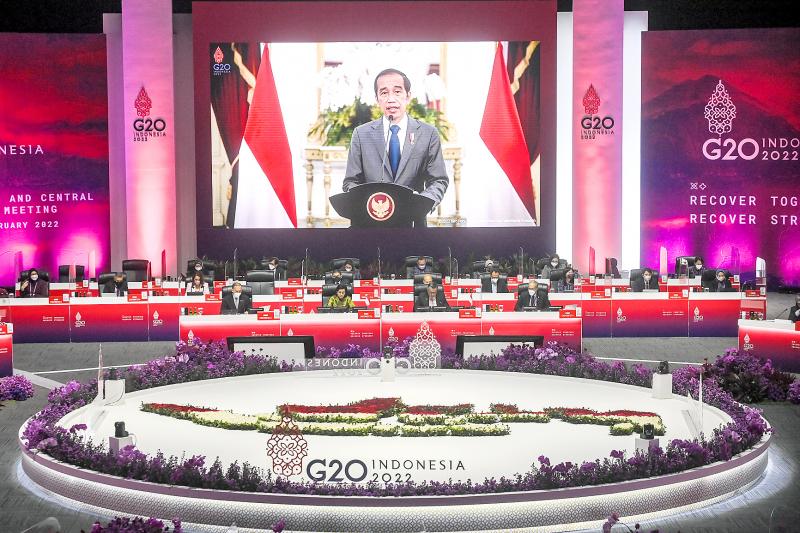Indonesian President Joko Widodo called for a de-escalation of tensions in Ukraine during a meeting of G20 finance ministers and central bank governors in Jakarta, warning that a conflict threatens security and would be disruptive to the world’s economic recovery from the COVID-19 pandemic.
“This is not the time for rivalry, nor is it the time to create new tensions that disrupt the world’s recovery, let alone endanger the safety of the world, as is happening in Ukraine today,” he said. “All parties must stop the rivalry and tension, we must focus on synergizing, collaborating to save and resurrect the world to quickly rise and recover.”
The remarks from the leader of Southeast Asia’s largest economy echoed concerns that an invasion of Ukraine would have far-reaching consequences.

Photo: EPA-EFE
Kiev’s Western allies say Russia has massed as many as 150,000 troops on its borders in a possible precursor to an attack and are voicing reservations about announcements from the Kremlin that it is withdrawing some forces.
“All countries are connected to each other, no one is isolated,” Widodo said. “The rise of one region will revive another region; the collapse of one region will also bring down other regions.”
Russia, which annexed Crimea from Ukraine in 2014 and supports separatists in Ukraine’s eastern Donbas region, has said it has no plans to invade.
Russian President Vladimir Putin has made clear that the order had been given only for a “partial” pullback and suggested that a full return to base would depend on how talks with the West go.
Australian Treasurer Josh Frydenberg said the situation was “deeply concerning” and it was in the collective interest that these tensions are resolved.
“We call upon Russia to de-escalate the situation for the alternative would be disastrous in human and economic terms,” he told the G20 conference.
The G20 consists of the EU and 19 countries with the biggest industrialized and emerging economies.
Washington, which last week released a strategy for the Indo-Pacific region as a means to counter China’s growing influence, is concerned Beijing would try to take advantage of the tensions between Russia and Ukraine.
“We stand for a world and a vision grounded in problem solving and innovation, not coercion and aggression,” US Assistant Secretary of State for East Asian and Pacific Affairs Daniel Kritenbrink said during a briefing yesterday.
“I think it stands in stark contrast to the vision of others, including that put forward by” Putin and Chinese President Xi Jinping (習近平), he added.

South Korea’s equity benchmark yesterday crossed a new milestone just a month after surpassing the once-unthinkable 5,000 mark as surging global memory demand powers the country’s biggest chipmakers. The KOSPI advanced as much as 2.6 percent to a record 6,123, with Samsung Electronics Co and SK Hynix Inc each gaining more than 2 percent. With the benchmark now up 45 percent this year, South Korea’s stock market capitalization has also moved past France’s, following last month’s overtaking of Germany’s. Long overlooked by foreign funds, despite being undervalued, South Korean stocks have now emerged as clear winners in the global market. The so-called “artificial intelligence

NEW IDENTITY: Known for its software, India has expanded into hardware, with its semiconductor industry growing from US$38bn in 2023 to US$45bn to US$50bn India on Saturday inaugurated its first semiconductor assembly and test facility, a milestone in the government’s push to reduce dependence on foreign chipmakers and stake a claim in a sector dominated by China. Indian Prime Minister Narendra Modi opened US firm Micron Technology Inc’s semiconductor assembly, test and packaging unit in his home state of Gujarat, hailing the “dawn of a new era” for India’s technology ambitions. “When young Indians look back in the future, they will see this decade as the turning point in our tech future,” Modi told the event, which was broadcast on his YouTube channel. The plant would convert

‘SEISMIC SHIFT’: The researcher forecast there would be about 1.1 billion mobile shipments this year, down from 1.26 billion the prior year and erasing years of gains The global smartphone market is expected to contract 12.9 percent this year due to the unprecedented memorychip shortage, marking “a crisis like no other,” researcher International Data Corp (IDC) said. The new forecast, a dramatic revision down from earlier estimates, gives the latest accounting of the ongoing memory crunch that is affecting every corner of the electronics industry. The demand for advanced memory to power artificial intelligence (AI) tasks has drained global supply until well into next year and jeopardizes the business model of many smartphone makers. IDC forecast about 1.1 billion mobile shipments this year, down from 1.26 billion the prior

People stand in a Pokemon store in Tokyo on Thursday. One of the world highest-grossing franchises is celebrated its 30th anniversary yesterday.